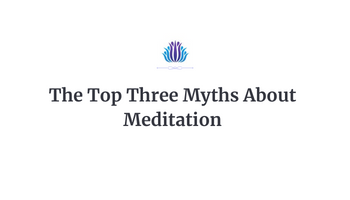Meditation is good for us. We all know it. Or….at least….most of us have some inkling that it is good for us. Meditation:
- Helps rewire the brain to be more capable of focusing productively
- Helps rewire the brain to facilitate less stress
- Strengthens the pre-frontal cortex so that we have more willpower
- Decreases our felt sense of pain by reducing cytokines in the body
- It increases happiness.
- Meditation increases compassion.
Despite all we know, however…the challenge is in implementing it. Often what keeps us from being willing to begin a practice is a misconception about what it is, how to do it, who it is for and how long it would take. I’m here to debunk the myths so that you can get started!
Myth #1: Meditation Means Quieting the Mind. I Can’t Do That.
This is a commonly held assumption – and its an unfortunate one. Meditation isn’t actually the act of calming the mind. Meditation is simply the act of focusing out attention on a singular thing for an extended period of time. Often a “quieter mind” might be the result of meditation. It’s not the act, however. In other words – meditation is about being present with what is. Sometimes – what IS is not a calm mind. Meditation is about learning to be okay with that.
Why This Myth is a Problem:
People who could stand to benefit most from meditation assume that doing it correctly means one must already knowing how to quiet the mind. So it ends up being self-defeating. A common complaint is “Meditate? Psh. My brain is always going a million miles an hour. No way could I do that.” You’re assuming you can’t quiet the mind…so you don’t start a practice.
What To Do About It:
Stop trying to quiet the mind. You’re forcing something that need not be forced. Instead, think about something you could focus on for a short period of time. For some it’s just focusing on your breath. It could be focusing intently on the dishes as you wash them. You could be on a walk and paying attention to your surroundings. Or…yes…you could sit still. But even if you sit still, be okay with the fact that your brain is going to drift off. Your job in meditation is not to FORCE that drift to stop. Instead, you’re just noticing when your mind drifts off, and then gently bringing your attention back.
Myth #2: Meditation is for Buddhists. I’m not a Buddhist.
That’s like saying that walking is only for Catholics. It makes absolutely no sense. Yes – it’s true. Many of those who practice Buddhism also practice meditation. But they are two different things. It is simply the act of focusing your attention on one thing for an extended period of time. It doesn’t matter whether the focus of your attention is the breath, the Buddha, God, or Athena. Meditation is for everyone.
Why This is a Problem
If you’re a part of a faith outside of Buddhist or Hinduism…it can be easy to assume meditation isn’t for you. You stay away out of fear that you are venturing into the realm of another spiritual practice. The reality is that meditation could help improve the depth of your current spiritual practice. Whether Catholic, Agnostic, Atheist, Jewish….its doesn’t matter. Everyone stands to benefit.
What You Can Do:
If you feel uncomfortable with the idea of aligning meditation with spirituality – then take it completely out of the realm of what would look to you to be prayer or worship. If you want to focus on a dot on a wall for an extended period of time – THAT is meditation. Stare at that sucker for hours. Notice when your thoughts drift. Every time it does, look right back at the dot. No God. No Allah. No Nada. Just you and a dot on a wall.
Myth #3 Meditation Takes Too Long. I Don’t Have Time
To get the benefits of meditation, you need only practice it for as little as five minutes a day. Have ten minutes? Even better. If you REALLY want to see shifts a bit more quickly, twenty minutes a day would simply accelerate your progress. Even if you only have 60 seconds to watch your breath…it adds up. You can “meditate” by doing some deep breathing while stopped at a red light. Just think…”at every red light, I am going to simply breathe deeply and notice as my chest swells and caves” That might only be a few seconds at a time. But by the end of the day, you could easily have been meditating for as long as 20 minutes.
Conclusion:
Meditation helps a myriad of ways. It improves your ability to focus. It reduces your stress. It increases your capacity for compassion – thus helping improve your relationships. It even reduces your physical sense of pain. The trouble is that many of us are not engaging in it simply because we have a false understanding about what it involves. Keep it simple. Keep it light. Keep it short. Those little moments of self care will go a LONG way in the end.

